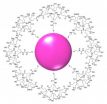(Press-News.org) A team of researchers from the National Institute of Standards and Technology (NIST), George Mason University and the University of Maryland has made nano-sized sensors that detect volatile organic compounds—harmful pollutants released from paints, cleaners, pesticides and other products—that offer several advantages over today's commercial gas sensors, including low-power room-temperature operation and the ability to detect one or several compounds over a wide range of concentrations.
The recently published work* is proof of concept for a gas sensor made of a single nanowire and metal oxide nanoclusters chosen to react to a specific organic compound. This work is the most recent of several efforts at NIST that take advantage of the unique properties of nanowires and metal oxide elements for sensing dangerous substances.
Modern commercial gas sensors are made of thin, conductive films of metal oxides. When a volatile organic compound like benzene interacts with titanium dioxide, for example, a reaction alters the current running through the film, triggering an alarm. While thin-film sensors are effective, many must operate at temperatures of 200° C (392° F) or higher. Frequent heating can degrade the materials that make up the films and contacts, causing reliability problems. In addition, most thin-film sensors work within a narrow range: one might catch a small amount of toluene in the air, but fail to sniff out a massive release of the gas. The range of the new nanowire sensors runs from just 50 parts per billion up to 1 part per 100, or 1 percent of the air in a room.
These new sensors, built using the same fabrication processes that are commonly used for silicon computer chips, operate using the same basic principle, but on a much smaller scale: the gallium nitride wires are less than 500 nanometers across and less than 10 micrometers in length. Despite their microscopic size, the nanowires and titanium dioxide nanoclusters they're coated with have a high surface-to-volume ratio that makes them exquisitely sensitive.
"The electrical current flowing through our nanosensors is in the microamps range, while traditional sensors require milliamps," explains NIST's Abhishek Motayed. "So we're sensing with a lot less power and energy. The nanosensors also offer greater reliability and smaller size. They're so small that you can put them anywhere." Ultraviolet light, rather than heat, promotes the titanium dioxide to react in the presence of a volatile organic compound.
Further, each nanowire is a defect-free single crystal, rather than the conglomeration of crystal grains in thin-film sensors, so they're less prone to degradation. In reliability tests over the last year, the nano-sized sensors have not experienced failures. While the team's current experimental sensors are tuned to detect benzene as well as the similar volatile organic compounds toluene, ethylbenzene and xylene, their goal is to build a device that includes an array of nanowires and various metal oxide nanoclusters for analyzing mixtures of compounds. They plan to collaborate with other NIST teams to combine their ultraviolet light approach with heat-induced nanowire sensing technologies.
INFORMATION:
The portion of this work conducted at George Mason University was funded by the National Science Foundation.
* G.S. Aluri, A. Motayed, A.V. Davydov, V.P. Oleshko, K.A. Bertness, N.A. Sanford and M.V. Rao. Highly selective GaN-nanowire/TiO2-nanocluster hybrid sensors for detection of benzene and related environment pollutants. Nanotechnology. 22 295503 doi: 10.1088/0957-4484/22/29/295503
Nanowire-based sensors offer improved detection of volatile organic compounds
2011-06-28
ELSE PRESS RELEASES FROM THIS DATE:
Servcorp Makes Its Debut as the Latest Serviced Office Makati Offering
2011-06-28
Servcorp Philippines, a company that belongs to the Servcorp business, recently announced its plans to enter the office space for rent Makati scene via its serviced offices.
The company aims to dominate the rental office scene by offering entrepreneurs with more options come rental time. Compared with other office rental spaces, Servcorp Philippines serviced office Makati offering comes fully equipped and ready to handle business needs via different packages.
Businesses that need receptionist or secretarial help will find the company's package feature in this area ...
Branch offices: New family of gold-based nanoparticles could serve as biomedical 'testbed'
2011-06-28
Gold nanoparticles are becoming the … well … gold standard for medical-use nanoparticles. A new paper* by researchers from the National Institute of Standards and Technology (NIST) and the National Cancer Institute's Nanotechnology Characterization Laboratory (NCL) proposes not only a sort of gold nanoparticle "testbed" to explore how the tiny particles behave in biological systems, but also a paradigm for how to characterize nanoparticle formulations to determine just what you're working with.
Prospective uses of gold nanoparticles, says NIST chemist Vince Hackley, include ...
Valdosta Author Wins Georgia Author of the Year and Shares with Sister
2011-06-28
Valdosta author Craig Rikard's award-winning memoir, "Hidden Epidemic" changed the "period" at the end of his sister's life to a "comma." Rikard, the recipient of the 47th Georgia Author of the Year Award for Memoir, writes in strong narrative about his mother's destructive and secret addition to prescription drugs. In his first time out as a memoirist, Rikard describes his book as the "story of two children disconnected from the wonder of childhood by keeping the secret of private drug abuse." Rikard survived his childhood, but his ...
Duke team finds new clues to how cancer spreads
2011-06-28
DURHAM, N.C. – Cancer cells circulating in the blood carry newly identified proteins that could be screened to improve prognostic tests and suggest targets for therapies, report scientists at the Duke Cancer Institute.
Building on current technologies that detect tumor cells circulating in blood, the Duke team was able to characterize these cells in a new way, illuminating how they may escape from the originating tumors and move to other locations in the body.
The circulating tumor cmoponents include proteins normally seen when embryonic stem cells begin to specialize ...
Researchers share useful lessons learned in evaluating emerging technologies
2011-06-28
Most industry executives, military planners, research managers or venture capitalists charged with assessing the potential of an R&D project probably are familiar with the wry twist on Arthur C. Clarke's third law*: "Any sufficiently advanced technology is indistinguishable from a rigged demo."
After serving for five years as independent evaluators of emerging military technologies nurtured by the Defense Advanced Research Projects Agency (DARPA), a team from the National Institute of Standards and Technology (NIST) shares critical "lessons learned" that can help businesses ...
DIG Coaching Practice presents ADHD and College Placement with Keith Kosierowski on Attention Talk Radio
2011-06-28
DIG Coaching Practice presents Attention Talk Radio on the topic of ADHD and college placement. Host Jeff Copper interviews ADHD coach Keith Kosierowski, founder and CEO of Kosierowski Education Group (KEG), who discusses college placement for the teenager with attention deficit hyperactivity disorder (ADHD).
Kosierowski is a certified school counselor with eleven years of experience in both local public and foreign-based schools and has worked at both the American Nicaraguan School and the American International School of Rotterdam as a middle and high school counselor ...
New study suggests potent antiplatelet drug effective with low-dose aspirin
2011-06-28
When taken with higher doses of aspirin (more than 300 milligrams), the experimental antiplatelet drug ticagrelor was associated with worse outcomes than the standard drug, clopidogrel, but the opposite was true with lower doses of aspirin.
The study is a secondary analysis of a clinical trial that compared the two drugs and found ticagrelor to be less effective in North America than in other countries.
Researchers suggest the aspirin dose in combination with anti-clotting medicine may alter ticagrelor's effectiveness.
The experimental antiplatelet drug ticagrelor ...
ExecProd Kenny Ortega Presents the New Thomas Guzman-Sanchez Dance-Oriented Feature Film OGFUNK Now Launching an International Talent Search in Assoc with GS Media
2011-06-28
A Clockman Vision Productions is currently packaging O.G. FUNK: TRAINING CAMP. Exec. Producer Kenny Ortega will be presenting the dance-oriented feature drama based on a story by Thomas Guzman Sanchez (urban street dancer/choreographer and film maker). An International search for cast members is now being launched. Using computer technology, anyone can audition in the comfort of their own home for this worldwide search for actors, dancers and skateboarders.
Robert Kubilos will handle directing duties on the screenplay scribed by Guzman Sanchez along with Kubilos. "Kenny ...
First patients receive lab-grown blood vessels from donor cells
2011-06-28
For the first time, blood vessels created in the lab from donor skin cells were successfully implanted in patients.
Functioning blood vessels that aren't rejected by the immune system could be used to make durable shunts for kidney dialysis, and potentially to improve treatment for children with heart defects and adults needing coronary or other bypass graft surgery.
For the first time, human blood vessels grown in a laboratory from donor skin cells have been successfully implanted into patients, according to new research presented in the American Heart Association's ...
False negative tests in breast cancer may lead to wrong drug choice
2011-06-28
A team of Yale Cancer Center researchers has confirmed that between 10-20% of breast cancers classified as Estrogen Receptor (ER) negative are really positive. Understanding when and why breast cancers may be misclassified has important implications for treatment and outcomes for women diagnosed with breast cancer. Its findings are published online in the June 28 Journal of Clinical Oncology.
A woman diagnosed with breast cancer can be tested by immunohistochemistry (IHC), a process that detects the presence of specific proteins in cancer tissue. Those who test positive ...


